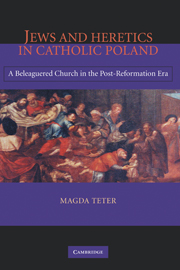After the reformation, the catholic clergy in poland sought to combat the spread of heretical ideas and, simultaneously, to promote Catholic doctrines, the one abetting the other. Catholic piety and dogma were promoted through devotional works and artwork in newly built or renovated baroque churches, serving as indirect religious polemic against Protestants. In more overt and more direct polemic, the Church provided Catholics with explicit counterarguments to Protestant ideas and and sought to discourage contacts between Catholics and heretics and others who did not submit to the authority of the Church.
PROMOTING MARY AND THE SAINTS
The vast majority of books written and published by the Catholic clergy in post-Reformation Poland were devotional. Still, even in these works, elements of polemic appeared in the promotion of baroque piety in the form of the cults of Mary, Jesus, and the saints, all figures the Protestants were challenging. The Church offered constructive responses to Protestant claims that Mary was Jesus' mother but not an object of veneration, that the cult of saints was a form of idolatry, and, as the anti-Trinitarians insisted, that Jesus was not divine. Protestants, for their part, acknowledged no intermediaries in the people's relationship with God. Wojciech Węgierski, a seventeenth-century Polish Protestant leader, wrote, “The Holy Scripture says that we should pray concerning our spiritual and bodily needs only to the true God, Father, Son and the Holy Spirit, who knows our hearts and human thoughts.
